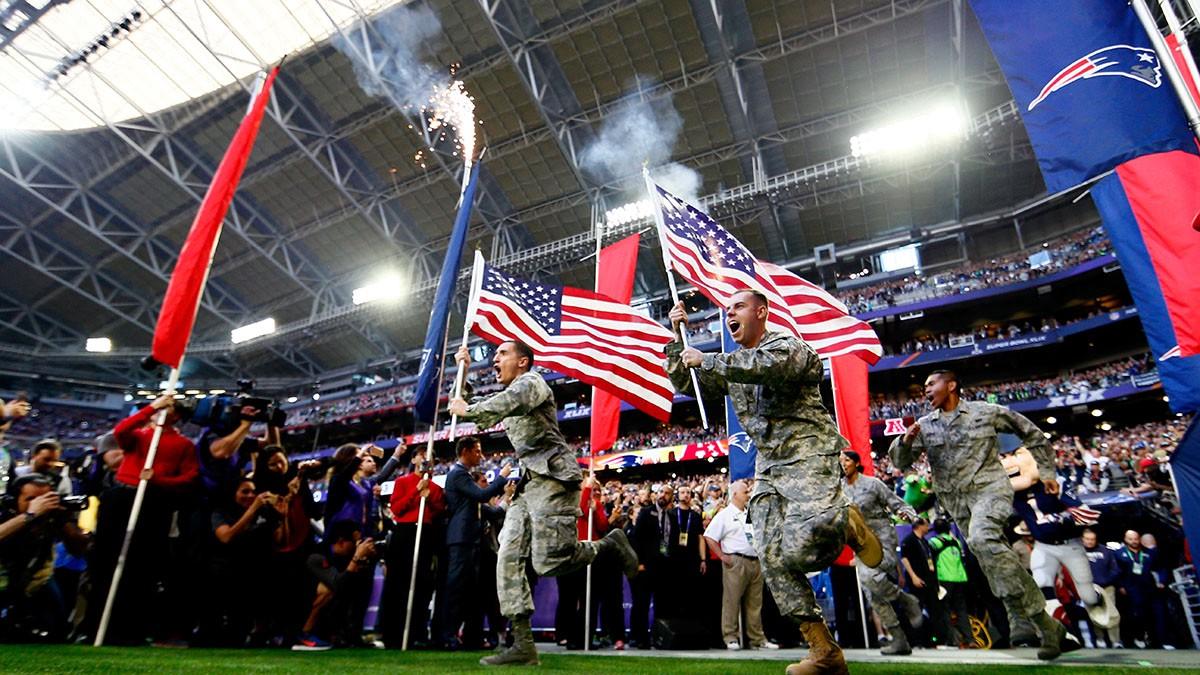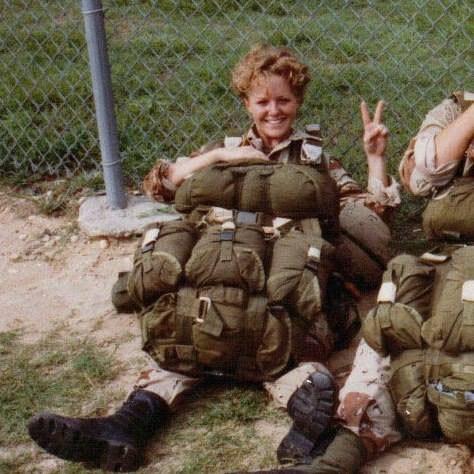Sports are helping prop up ‘plastic patriotism’

Members of the United States military run onto the field prior to Super Bowl XLIX between the Seattle Seahawks and the New England Patriots at University of Phoenix Stadium on Feb. 1, 2015 in Glendale, Arizona. (Photo by Kevin C. Cox/Getty Images)
At some sporting event, somewhere in the U.S., the national anthem plays, the colors are posted, and a young athlete takes a knee in protest. This act — in fact, the mere mention of this act in even the most benign terms — sparks strong emotions and controversy.
Some admire the professional athlete using a highly visible platform to peacefully protest inequality on a public stage. Others express outrage at the “disrespect” of our men and women who have fought so bravely to defend the freedom of the very people taking a knee during our national anthem. Some stand, confused, unsure how these became the only two possible interpretations of taking a knee and how in the world it became about military veterans.
Growing up in the U.S., I have always loved the rich traditions of patriotism around major sporting events, like the Olympics, the World Series or the Super Bowl. During those events, we stood, hand over heart. We listened to the national anthem. We watched the fireworks, military flyovers, and displays representing freedom.

Karen Gallagher, then a paratrooper, preparing for a training jump at Ft. Bragg, NC shortly before deployment. (Photo courtesy Karen Gallagher)
This isn’t to say civilians don’t care about the women and men fighting the wars. I firmly believe they do. However, this ever-growing divide between the families that serve and those that don’t have made the country ripe for what some call “plastic patriotism,” or superficial displays of patriotism that may be an attempt to bridge the divide, but instead dangerously widens it. It involves “hero worship” and the idea that any word or act criticizing American policies or symbols is a slap in the face to the heroes that served our country and died for your freedom.
When I do talk in my closed networks of veterans, we often talk about the damage hero-worship does to returning service members, how it feeds the narrow narrative that we are either homeless or heroes, and ignores the diversity that we, like every other culture, are comprised of diverse individuals, with diverse views.
I do not pretend to speak for all veterans; I can only offer my perspective. When I do talk in my closed networks of veterans, we often talk about the damage hero-worship does to returning service members, how it feeds the narrow narrative that we are either homeless or heroes, and ignores the diversity that we, like every other culture, are comprised of diverse individuals, with diverse views.
Some veterans are offended by an athlete taking a knee. I understand that this comes from valuing the symbols of our freedom and dislike of any display they deem as disrespectful. I respect their right to express that view.
Some veterans, like me, feel used in this debate. I feel that instead of engaging in a topical debate on racism or social inequality, those against the protesters defer to an ad hominem retort, calling the protestors “un-American” and somehow making the leap to “anti-veteran.” The argument evolved into a strict dichotomy: either you stand up during the national anthem, or you hate those who served and died for your freedoms. When acts of inequality make the news, and then not-so-peaceful protests breakout, I hear the anti-protestors asking, “Why can’t they peacefully protest?” Remember that they did, and when they did, they were penalized, called anti-American, anti-Veteran, and silenced.
Beyond the rights of the protestors protected by the U.S. Constitution, the collateral damage of this polarizing argument lands squarely on the American veteran who is being lumped into one unattainable, unrealistic caricature of heroisms, held up to be worshipped. It dehumanizes us, thus widening the military-civilian divide and distancing us from the needed support of our civilian neighbors as we attempt to regain our place as individuals in civilian society.
A friend once told me that getting out of the military is like going home, but home is now another country, another culture. Transition out of the military is difficult enough without the divisiveness of plastic patriotism. Supporting veterans and military service members has to go beyond a meme on social media, a quick “Thank you for your service,” and hero worship. I support your right to protest. I support your right to protest the protestors. I do not support the use of military veterans to block meaningful discussion and to breed hatred.
I raised my right hand, and I swore to support and defend the Constitution of the United States of America. I committed to whatever service my country needed, and I deployed to war. I served to protect the rights of Americans, the freedoms, including the right to freedom of speech contained in the very Constitution I took an oath to support.
I didn’t serve to protect and defend the freedoms of some Americans, or only with the Americans with whom I agree. I took an oath to defend the freedoms of all Americans.
I didn’t serve to protect and defend the freedoms of some Americans, or only with the Americans with whom I agree. I took an oath to defend the freedoms of all Americans. Like so many military families, mine will continue in the family tradition as I will send my youngest son off to basic training next month. My husband swore him in as he took his oath of enlistment. Like me and so many in our family who served in every war, he will freely offer his safety, indeed, his life if needed, in service and support of this country. He will defend your freedoms and the freedoms of those athletes who take a knee whether he agrees with them or not.
Having served and now sending my son off to serve, I clearly have skin in this game. In the interest of bridging the military-civilian divide for my son and the next generations of veterans, I hope we can all open the discussion beyond name-calling and dragging military veterans into a debate that isn’t really about us. I hope we can stop allowing plastic patriotism to divide us. I respect your right to free speech and peaceful protest, especially those not laced with hate. I will continue to stand up for the right to free speech. However, I am taking a knee on plastic patriotism.

Photo of Karen Gallagher, Senior Postdoctoral Research Scholar for the Global Sport Institute at ASU.
Karen Gallagher is a Senior Postdoctoral Research Scholar for the Global Sport Institute at Arizona State University, a U.S. Army veteran, and a Tillman Scholar. Her work focuses on service-related conditions and transition in military veterans. Her current research focus explores parallels between veterans and athletes in wellness, cognition, and empowerment in the post-sport journey.
This article was originally published on the Global Sport Institute’s publication, globalsportmatters.com.
The Global Sport Institute cares for the health and safety of all its readers. If you are having thoughts of hurting yourself or need someone to talk to, please take action now by calling 1-800-273-8255 or by visiting suicidepreventionlifeline.org. For other resources, visit the Mental Health Resources Guide.